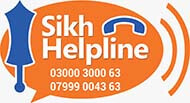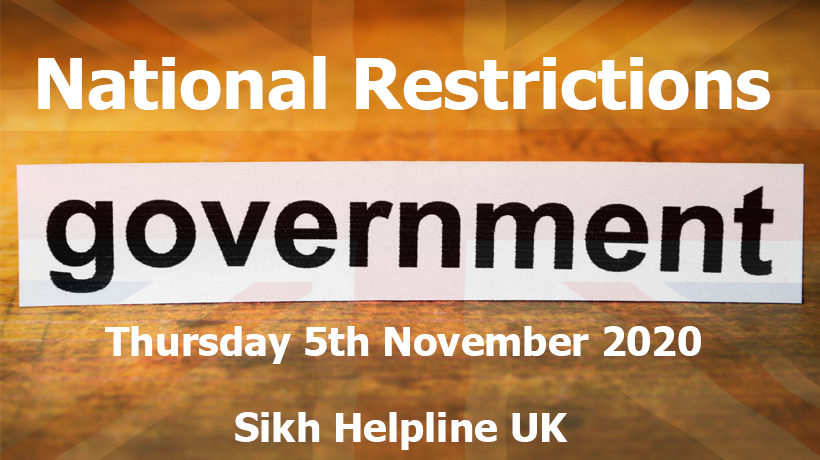- Requiring people to stay at home, except for specific purposes
- Preventing gatherings of people from different households, except for specific purposes
- Closing non-essential businesses and venues.
(https://www.gov.uk/guidance/
1. Stay at home


- for childcare or education, where this is not provided online
- for work purposes, where your place of work remains open and where you cannot work from home.
- to exercise outdoors or visit an outdoor public place – with the people you live with, with your support bubble or, when on your own, with 1 person from another household.
- for any medical concerns, reasons, appointments and emergencies, or to avoid or escape risk of injury or harm – such as domestic abuse
- shopping for basic necessities, i.e. food and medicine, which should be as infrequent as possible
- to visit members of your support bubble or provide care for vulnerable people, or as a volunteer this is not an exhaustive list and will be outlined in better detail by the government in days to come.
2. Staying safe outside the home (Social Distancing)
You should minimise time spent outside your home and around other people. Ensure that you are two metres apart from anyone not in your household or support bubble
3. Meeting with family and friends
You must not meet socially indoors with family or friends unless they are the people you live with – or your support bubble.
A support bubble is where a household with one adult joins with another household. Households in that support bubble can still visit each other, stay overnight, and visit outdoor public places together.
You can exercise or visit outdoor public places with the people you live with, your support bubble, or 1 person from another household.
Outdoor public places include:
- parks, beaches, countryside,
- public gardens (whether or not you pay to enter them), allotments
- playgrounds
You cannot meet in a private garden.
4. Businesses and venues
To reduce social contact, the Government has ordered certain businesses and venues to close. These include:
- all non-essential retail, including, but not limited to clothing and electronics stores, vehicle showrooms, travel agents, betting shops, auction houses, tailors, car washes, tobacco and vape shops.
- indoor and outdoor leisure facilities such as bowling alleys, leisure centres and gyms and sports facilities.
- entertainment venues such as theatres, concert halls, cinemas, museums and galleries, casinos, adult gaming centres and arcades.
- personal care facilities such as hair, beauty and nail salons, tattoo parlours, spas, massage parlours, body and skin piercing services, non-medical acupuncture, and tanning salons.
Food shops, supermarkets, garden centres and certain other retailers providing essential goods and services can remain open. Essential retail should follow COVID-secure guidelines to protect customers, visitors and workers.
Non-essential retail can remain open for delivery to customers and click-and-collect.
Playgrounds can remain open.
Hospitality venues like restaurants, bars and pubs must close, but can still provide takeaway and delivery services. However, takeaway of alcohol will not be allowed.
Hotels, hostels and other accommodation should only open for those who have to travel for work purposes and for a limited number of other exemptions which will be set out in law.
A full list of the business closures will be published in the coming days and set out in law.
Some venues will be allowed to remain open for specific exempt activities, like childcare and support groups. This includes support to victims of crime, people in drug and alcohol recovery, new parents and guardians, people with long-term illnesses, people facing issues relating to their sexuality or gender, and those who have suffered bereavement.
A number of public services will also stay open and you will be able to leave home to visit them. These include:
- the NHS and medical services like GPs.
- Jobcentre Plus sites
- Courts
- Civil Registrations Offices
5. Weddings, civil partnerships, religious services and funerals
Funerals can be attended by a maximum of 30 people, and it is advised that only close friends and family attend. Linked ceremonial events such as stone settings and ash scatterings can also continue with up to 15 people in attendance.
Weddings, civil partnership ceremonies will not be permitted to take place except in exceptional circumstances.
Places of Worship will be closed, unless they are being used for:
- Funerals
- To broadcast acts of worship
- Individual prayer
- Formal childcare or where part of a school
- Essential voluntary and public services, such as blood donation or food banks
- Other exempted activities such as some support groups
6. Going to work
To help contain the virus, everyone who can work effectively from home must do so. Where people cannot do so, they should continue to travel to work/attend their workplace. This is essential to keeping the country operating and supporting vital sectors and employers.
Public sector employees working in essential services, including education settings, should continue to go into work . The risk of transmission can be substantially reduced if COVID-secure guidelines are followed closely. Extra consideration should be given to those people at higher risk.
7. Going to school, college and university
The Government will continue to prioritise the wellbeing and long-term futures of our young people and will not be closing schools, colleges or universities. Schools have implemented a range of protective measures to make them safe.
Universities have welcomed students back and the Government have published guidance advising universities on reopening to ensure they have safety measures in place to minimise the spread of the virus.
There are further restrictions in place:
- If you live at university, you must not move back and forward between your permanent home and student home during term time. You should only return home at the end of term for Christmas. Further guidance will be publish by the Government toward the end of term.
8. Childcare and children’s activities
Parents will still be able to access some registered childcare and other childcare activities where reasonably necessary to enable parents to work, or for the purposes of respite care.
Early years settings can remain open. Parents are able to form a childcare bubble with another household for the purposes of informal childcare, where the child is 13 or under.
Some youth services may be able to continue, but most youth clubs and groups will not be available during this period.
9. Protecting people more at risk from coronavirus
If you are over 60 or clinically vulnerable, you could be at higher risk of severe illness from coronavirus. You:
- should be especially careful to follow the rules and minimise your contacts with others
- should continue to wash your hands carefully and more frequently than usual and maintain thorough cleaning of frequently touched areas in your home and/or workspace
Clinically vulnerable people are those who are:
- aged 60 or over (regardless of medical conditions)
- under 60 with an underlying health condition listed below (that is, anyone instructed to get a flu jab each year on medical grounds):
- chronic (long-term) mild to moderate respiratory diseases, such as asthma, chronic obstructive pulmonary disease (COPD), emphysema or bronchitis
- chronic heart disease, such as heart failure
- chronic kidney disease
- chronic liver disease, such as hepatitis
- chronic neurological conditions, such as Parkinson’s disease, motor neurone disease, multiple sclerosis (MS) or cerebral palsy
- diabetes
- a weakened immune system as the result of certain conditions or medicines they are taking (such as steroid tablets)
- being seriously overweight (a body mass index (BMI) of 40 or above)
- pregnant
There is a further group of people who are defined, also on medical grounds, as clinically extremely vulnerable to coronavirus – that is, people with specific serious health conditions. Over this period, we are advising the CEV to work from home. If you cannot work from home, you are advised not to go to work and may be eligible for Statutory Sick Pay (SSP) or Employment Support Allowance (ESA). You are encouraged to stay at home as much as possible, but are encouraged to go outside for exercise. The full new guidance will be published by the Government on Monday 2 November and the Government will write to everybody who is clinically extremely vulnerable to set out detailed advice while the new restrictions are in place. Current advice is in place at each local COVID alert level.
10. Visiting relatives in care homes
Guidance on care home visits will be published ahead of Thursday. For now, you should follow existing guidance
11. Travel
You should avoid travelling in or out of your local area, and you should look to reduce the number of journeys you make. However you can and should still travel for a number of reasons, including:
- travelling to work where this cannot be done from home
- travelling to education and for caring responsibilities
- hospital GP and other medical appointments or visits where you have had an accident or are concerned about your health
- visiting venues that are open, including essential retail
- exercise, if you need to make a short journey to do so
If you need to travel we encourage you to walk or cycle where possible, and to plan ahead and avoid busy times and routes on public transport. This will allow you to practise social distancing while you travel.
Overnight stays and holidays away from primary residences will not be allowed. This includes holidays abroad and in the UK.
You must not travel if you are experiencing any coronavirus symptoms, are self-isolating as a result of coronavirus symptoms, are sharing a household or support bubble with somebody with symptoms, or have been told to self-isolate after being contacted by NHS Test and Trace.
If you need to use public transport – to travel to work for example – you should follow the safer travel guidance. This includes the rules on wearing face masks and advice on car sharing.
For those planning to travel into England, you should check the current travel corridor list to see whether you need to isolate for 14 days. You will still be required to abide by the restrictions set out here even if you do not need to isolate.
British nationals currently abroad do not need to return home immediately. However, you should check with your airline or travel operator on arrangements for returning.
12. Financial support
Workers in any part of the UK can retain their job, even if their employer cannot afford to pay them, and be paid at least 80% of their salary up to £2500 a month.
The flexibility of the current CJRS will be retained to allow employees to continue to work where they can.
Employers small or large, charitable or non-profit are eligible and because more businesses will need to close, they will now be asked to pay just National Insurance and Pensions contributions for their staff during the month of November – making this more generous than support currently on offer.
The Job Support Scheme will not be introduced until after Coronavirus Job Retention Scheme ends Wherever you live, you may be able to get financial help through the:


